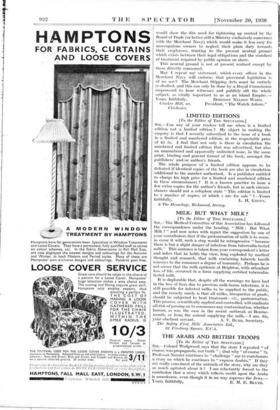THE CONDITIONS OF MERCHANT SEAMEN
[To the Editor of TEE SPECTATOR.]
SIR,—In spite of the seemingly cheerful news of the better conditions for Merchant Seamen, carried by a two-thirds majority at the Geneva Convention and described hi The Spectator of October 30th as a veritable " Seamen's Charter," it appears unlikely that any Merchant Navy officer will be encouraged thereby to any great rise of spirits. " Hope deferred," we are told in Holy Writ, " maketh the heart sick " I The Government, shackled as it has always been by powerful interests in both Houses of Parliament, has systematically resisted any real progress in the conditions of life at sea. Instead of leading Europe, Britain has always lagged behind, though her position as the greatest maritime nation in the world ought to have made het' show a good example of justice and humanity.
Alas, it seems that "only money talks." Surely Members of Parliament will not let this matter rest Recent enquiries have drawn the veil somewhat from the miserable conditions in which too many of these splendid, patient men spend their working lives, with nothing to look forward to but an old age of poverty and anxiety. It seems to me impossible that Parliament can continue to refuse what they have begged for so earnestly, namely a Royal Commission or other public enquiry into the Merchant Shipping Acts, those obsolete instruments which control life at sea ? As Earl Beatty said when. their request was debated in the House Of Lords, after the Petition signed by fourteen thousand officers had been received, " Why not, unless there is something to hide "
For examples of injustice, inhumanity and neglect, I could give chapter and verse did space permit, but I have heard it stated by the head of a large shipping firm, that it is impossible to generalise from individual cases.
This may be true to some extent, but a public enquiry
would show the dire need for tightening up control by the Board of Trade (or better still a Ministry exclusively concerned with the Meichant Navy) which would make it less easy for unscrupulous owners to neglect their plain duty towards their employees, trusting to the present neutral ground which exists between their legal obligations and the standard of treatment required by public opinion on shore.
This neutral ground is not at present realised except by those directly concerned.
May I repeat my statement, which every officer in the Merchant Navy will endorse, that piecemeal legislation is of no use ? The Merchant Shipping Acts must be entirely ye:drafted, and this can only be done by a Royal Commission empowered to hear witnesses and publicly sift the whole subject, so vitally important to us as an island Empire.— Crocker Hill, nr. President', " The Watch Ashore." Chichester.





























































 Previous page
Previous page